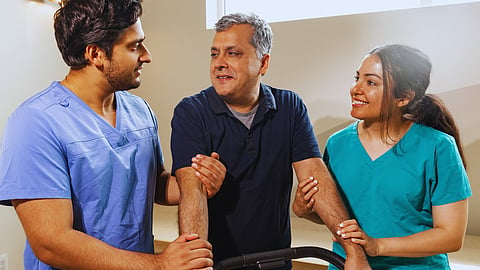
- LIFESTYLE
- FASHION
- FOOD
- ENTERTAINMENT
- EVENTS
- CULTURE
- VIDEOS
- WEB STORIES
- GALLERIES
- GADGETS
- CAR & BIKE
- SOCIETY
- TRAVEL
- NORTH EAST
- INDULGE CONNECT

Working as a nurse can be extremely taxing. Imagine nights when they cannot sleep, their minds racing with anxiety, and constantly worrying about their sick patients and their family. They do an immense job as caregivers, but often lack the respect doctors get, not to mention adequate rest, and family time.
Studies consistently show that nurses, particularly those in critical care, suffer from high rates of depression, anxiety, burnout, and even suicide. One-third of nurses surveyed during the COVID-19 pandemic reported psychological distress.
Nurses are 18% more likely to die by suicide compared to the general population. The reasons include long hours, understaffing, rotating shifts, emotional strain, violence, discrimination, and a persistent stigma around seeking help.
Despite fears that AI may one day replace nurses, it is far more realistic to see AI as a tool to support nurses.
Uday Kumar Paul, who is now a registered nurse at Manipal Hospitals (MHEPL) ,shared his experience working as a nurse when he graduated.
"The work culture and nurse-patient assignments were terrible. They used to assign me three patients in the ICU, which is an unacceptable ratio. It was practically impossible to manage patients on ventilators... dealing with other complex conditions," he writes on Quora.
AI cannot replace what nurses bring to the table such as real-life experience, empathy, and cultural understanding. They make complex decisions based on a whole-person perspective. They offer human connection, advocacy, and comfort in moments of vulnerability.
AI, on the other hand, could automate routine tasks, analyse vast amounts of data, and spot trends that humans might miss. For nurses, this means AI can ease the burden of tasks like:
Monitoring vital signs continuously and flagging early signs of deterioration.
Managing medication schedules and documentation.
Assisting with patient lifting or fall detection.
Answering routine patient queries via chatbots.
Generating real-time clinical insights to help with fast decision-making.
By automating repetitive duties and reducing administrative overload, AI frees up nurses to focus on direct patient care and emotional support. That shift can significantly reduce burnout and mental fatigue.
More importantly, AI can help create healthier, safer workplaces. Smart staffing tools can reduce overload. Wearable tech can monitor stress levels. AI-driven reporting systems can identify patterns of workplace violence or discrimination. And mental health bots and predictive tools can provide early interventions for psychological distress.
AI can also enhance nursing education, preparing nurses to navigate tough conversations, cultural sensitivity, and critical illness scenarios through simulations and personalised learning.
Of course, we cannot overlook the cons of using AI. AI can reinforce biases in training data or erode trust if not used ethically. Nurses must remain at the centre of care, guiding how AI is implemented. Their feedback is invaluable to adopting new tech tools.
But technology alone isn’t enough. Healthcare systems must also ensure that human issues like burnout and unfair workloads are addressed. This means training nursing supervisors and in-charge staff to avoid overextending nurses, especially those already working overtime. Real support requires both smart tools and smart leadership.
Nursing takes up an immense amount of labour and involves an emotional load that is often invisible. Shoving nurses aside and treating them with disrespect does little to lighten that burden.
AI can give nurses the time, space, and support to keep caring. But we also need to do our bit and thank them. That is the bare minimum they deserve.